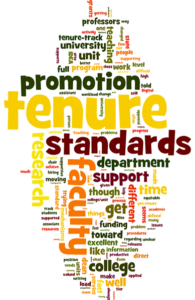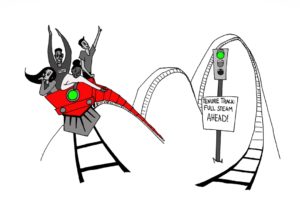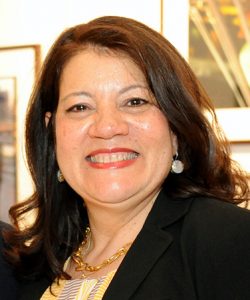In this moment of anxiety and uncertainty, it’s natural to feel even more stress about the already stressful tenure and promotion process. Since we can’t meet in person, we’ve organized this post to include some advice and tools that we would have shared with your in person at our Professional Development Workshop. You’ll see these tips and tools hyperlinked throughout this post.
First, it is important that you start planning for your tenure and promotion. We created deck of slides you can use to plan your success year by year. For instance, your third and fourth year are important moments to show benchmarks in publishing. Have you published peer-reviewed articles or significant creative work? Have you identified a list of ideal publishers for your book? Let’s be clear: there will always be bumps in the road; Matt Brim shared his Response to Fourth Year Review that didn’t go as well as he’d hoped. The moment helped him get clear about what he needed to do to succeed, and he did just that (Matt just got promoted to full professor and his third book was recently published by Duke UP). Remember, this is a marathon. Do not let a setback derail you.
Your sixth year is another important milestone year. By the end of it, you should have the bulk of your dossier ready to go out for national review. Its a scary process, so don’t hesitate to ask for advice. Your department chair and or colleagues who have recently been through the process can share all kinds of insights.

In our experiences, we learned the most from colleagues who were willing to share their candidate statements. FFPP Mentor Katherine Chen shared an Annotated Tenure Statement that shows the logic she used to draft hers. Statements like these provide a narrative of your career–they tell who you are, what you value as a scholar and as a teacher, and they provide the language that sets the tone for a review committee’s discussion of you and your accomplishments. In your narratives, please be sure to describe not just the labor of your work (e.g., archival research, interviews, translations, or grant funding), but also the impact (e.g., citations on Google Scholar, downloads on Academic Works, reviews, or invited lectures). Think of your work not just in the present–what about your past work? What about future projects? Where are they in the pipeline of what will be a long and active career post-tenure and promotion?
Regardless of where you are in your career, its always a good idea to be mindful of the stories you tell about your professional self. Are you always complaining? Do you share your good news? The stories you tell accumulate in your institution’s memory. Bethany Albertson’s Operation Keep My Job offers excellent insight on this point. “4 Steps to a Strong Tenure File” and Publishing as Strategy by Karen Kelsky also offer insight into how you can organize for the long view of a successful academic career.
Finally, always remember the hard part is behind you. You got the job–a tenure track job in a highly competitive market! Now is the time to get over that imposter syndrome and trust yourself. When you feel unsure, ask for help. Your College’s Provost’s Office, or its Office of Academic Affairs, has a schedule for tenure and promotion that you should access well before you need it. It will help you organize. And besides your department chair and your colleagues on your home campus, you have your FFPP Mentor and Fellows–our working groups are always confidential. The PSC CUNY Union will help you understand your rights, and if necessary, it will assist you if you need to file a grievance.
Please dig into our Commons site for even more resources. For instance, we posted on CUNY’s March 2020 Guidance Memo that allows tenure track faculty the option to delay tenure and promotion review. You’ll also find a trove of publishing resources. Please let us know if you need something and you can’t find it here in our Commons Community.
Wishing you health, safety, and peace in this chaos. May you have tremendous success in your career.
xo, Shelly, Matt, and all the FFPP Mentors






